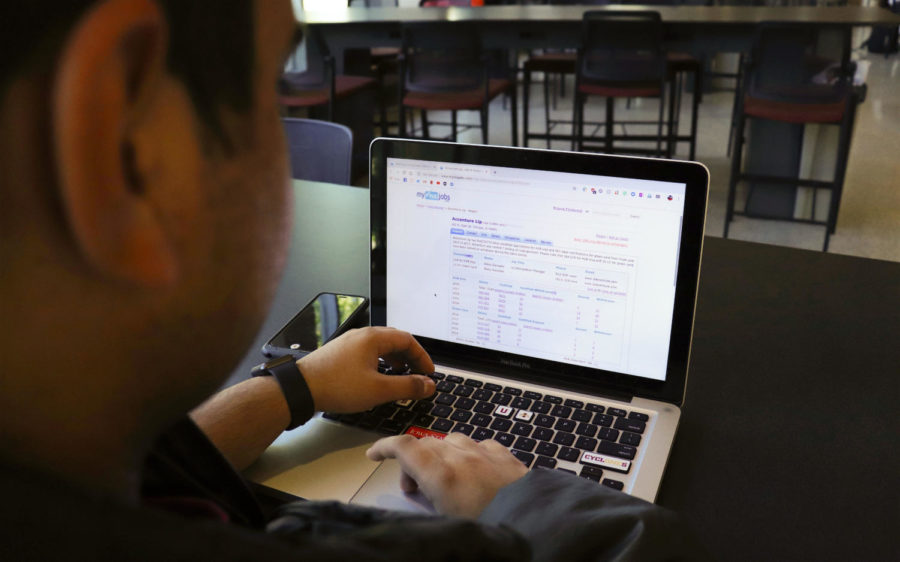International students face anxiety on job hunting
Tushar Sharma is browsing a website named “myVisajobs,” a job-hunting website designed for international students to find companies and employers that provide work-visa sponsorship.
October 21, 2018
International students have two months after graduation to find a job, if not, they must return to their home country.
Tushar Sharma is a senior in management information system at Iowa State. Like most college seniors, Sharma is looking through job hunting websites, attending careers fairs and polishing resumes so he can land a full-time job. However, the whole process is more challenging for him because of his international student background.
“It’s getting harder and harder for international students to find jobs and stay in the United States after graduation,” Sharma said. “Especially in the past two years.”
Sharma said companies are stricter on selecting international student employees. They only consider students that are exceptional and over-the-top excellent.
“Companies will just straight up tell us they don’t sponsor international students, because they have to pay a certain amount of money,” Sharma said. “That is something that is always hurting me and scaring me. I have to get a full-time job. There is no other way.”
Sharma graduates in May 2019. He has two months to find a full-time position after graduation. That means, if in that two-month period he didn’t find a job, he would lose his legal immigration status and must go back to his country.
“It’s extremely hard to find jobs as international students,” Sharma said. “Sometimes I spend one hour filling out applications, and the last question is, are you an international student. Then I know right there that I won’t get the job for sure.”
Companies are required to pay around $3,000 to the government for international students’ sponsorships. That’s one of the reasons companies and employers hesitate to offer sponsorships.
“It might depend on luck as well. If you get just one job offer, then you are set,” Sharma said. “If not, then it’s heart broken.”
David Gluckman, immigration attorney, said the anxiety and fear surrounding immigration policy changes have intensified since the 2016 election.
“The immigration process has always been hard, but this administration has just made it harder,” Gluckman said. “Whenever there is a gray area, where they can go one way to make it easier or the other way to make it harder, they always go the other way to make it harder.”
Many immigration laws have not changed at all, Gluckman said. He said it’s the ways things are being examined by the new administration that generate fears.
“They are looking at things with a tiny microscope to try to find any problems necessary,” Gluckman said.
Gluckman suggests international students find reliable and credible representatives to manage their cases.
“If you have some guy who doesn’t know what he’s doing handling your immigration case. He makes one mistake then you have to go back home, and he gets to keep your money,” Gluckman said. “And sometimes there are no opportunities to come back.”
Not all companies are familiar with international student sponsorship process. In this case, international students often have a miscommunication with their employers and end up losing an opportunity.
Anne Benning, human resources team leader for Viafield, said her company has had an international student from Ukraine working as an intern but has never employed any international students for full-time positions.
“We actually wanted to keep the student, but apparently, there is a limit,” Benning said. “I know there is a procedure, but by the time we get the students, and we like them, and we want them to stay, the deadline has already passed.”
The “limit” and “deadline” Benning refers to are work visa quota and case evaluation starting time. United States Citizenship and Immigration Services issues 85,000 new H-1B (the most common work visa) approvals each year, and they begin to accept cases starting April 1.
In the incident Benning mentioned, by the time her company started the sponsorship process, the 85,000 quotas have already been filled.
“If we had some additional information and all the details beforehand, it is something we are willing to look into,” Benning said.
Sharma said the international student job hunting is an issue he cannot do anything about because the United States is “not my country and not my place.”
“All I can is to be mentally and technically strong,” Sharma said. “I need to learn new things outside classes and know how to answer interview questions perfectly.”
















